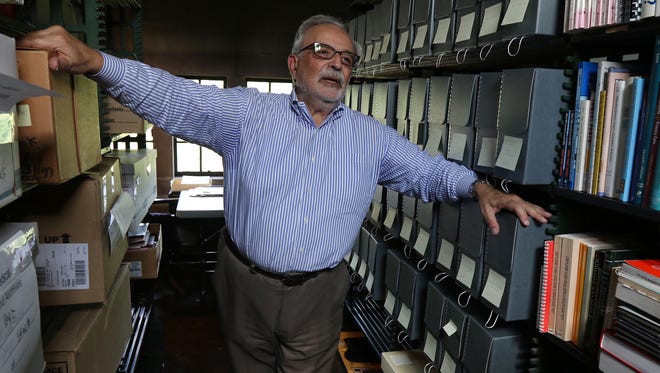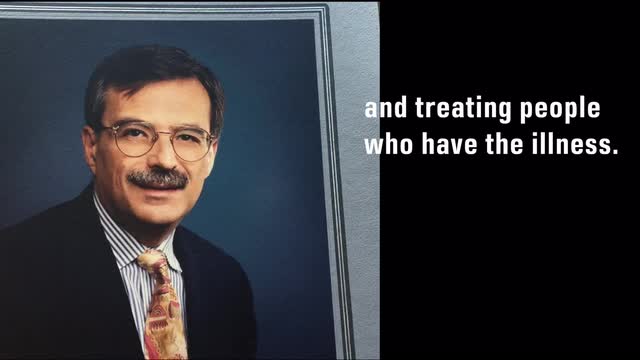Editor’s Note: This story by Patti Singer was originally published in 2016. We republish it to acknowledge the 40th anniversary of the first cases that would be linked to HIV/AIDS in a now historic edition of the CDC’s Morbidity and Mortality Weekly Report released June 5, 1981.
At the time, Dr. William Valenti was an infectious disease physician at the University of Rochester. Now Senior Vice President for Strategic Advancement, Chief of Innovation, Co-Founder, and Staff Physician at Trillium Health, he said in a statement Friday;
“Something about it was troubling – it was a cluster of cases in gay men. This was during a time when people rarely talked about sexual health or sexually transmitted infections. It would eventually become a global pandemic,” Valenti recalled.
“There was no turning back. There was a constant stream of new patients. The learning curve was steep. It was very much like COVID – we were getting new information on a daily basis,” said Dr. Valenti.
He hopes to see the end of HIV/AIDS in his lifetime. “I’m cautiously optimistic about a real cure – a vaccine to prevent it, or a way to eliminate it from the body after early detection and treatment,” Valenti said.

Original Story:
Somewhere — if he could just put his hands on it — is the article that changed his life.
In one of the 60 or so boxes Dr. William Valenti already has provided to posterity, or maybe in the 10 boxes still in his office, sits the June 5, 1981, report from the Centers for Disease Control and Prevention about five gay men with infections that overwhelmed their immune systems.
“Right from the beginning with HIV, AIDS as it was first known, you knew there was a story to be told,” said Valenti, who has been providing care to people with the disease ever since it was first identified.
Valenti said he’s careful with what he tosses, then in the next breath admitted he’s less meticulous with how he saves things.
Fortunately for anyone who wants to know about Rochester’s response to AIDS, Valenti’s papers EW cataloged at the Rochester Medical Museum and Archives, housed at the Rochester Academy of Medicine at 1441 East Ave.
If placed end to end, the 16 shelves holding the Valenti Collection of Early AIDS Imprints would stretch 45 feet. (A catalog of the holdings is below.)
“At this stage of my career, what it means to me is you know, we almost did it,” said Valenti, standing at the shelves, his hands resting on two of the boxes. “I feel like this is what it took to get to the finish line, or even begin to talk about the finish line.”

The collection contains presentations and articles written by Valenti, who was among the first doctors in the country to treat people with HIV/AIDS. Most of the material comes from 1985 to 1999, and it includes journal articles, publications from international AIDS conferences, videos, photos and medical and pop culture books about the disease. Valenti said he did not keep diaries, but the collection does have his annotated appointment books and personal items such as letters, speeches and awards.
While a Google search might be able to turn up some of the documents, the Valenti Collection puts them in one place. The catalog is expected to be online by the end of the year, but the collection will need to be viewed in person.
“I think it should appeal to people who have a social conscience and are looking at how society responds to the HIV epidemic,” said Dr. Steve Scheibel, who co-founded the Community Health Network with Valenti in 1989.
“As Bill would say, there are lessons to be learned,” said Scheibel, now director of research at Borrego Health in southern California. “It would be a shame if we didn’t have that history … to learn our lessons earlier as opposed to learning them later.”

Valenti was overseeing the infection prevention program at Strong Memorial Hospital when he read the CDC article.
“All of a sudden, because I had been dealing with exotic or interesting diseases, when HIV came along it wasn’t characterized, nothing was known, nothing was clear,” he said. “So I got interested and started seeing patients after it was first described.”
Valenti said his professional and personal circles accepted the need to help treat individuals who were stigmatized in other circles because of the disease.
“Something as frightening as a fatal illness that kills young people can be pretty disabling,” Valenti said. “What we were doing gave people some kind of focal point to participate in the response.”
Valenti is writing a memoir about the first 10 years of AIDS, which he expects to self-publish in time for World AIDS Day.
“I think about the patients and their families,” he said. “In the early days, it seems like everyone came to an appointment with their mother. A lot, a lot of mothers. A lot of families in the early days, families’ lives interrupted.”
He recalled weeks in which he attended multiple funerals, and remembered fundraising efforts that would help people with AIDS. Community Health Network saw 76 patients its first year. It is now Trillium Health, which also provides primary care to lesbian, gay, bisexual and transgender individuals.
More:Alarming rise in STIs has experts calling for more inclusive sex education

For several years, Valenti’s papers had been at the AIDS Resource Library at Monroe Community College, where they were used by students in the health professions. Around 2006, the collection came to the Rochester Medical Museum and Archives, the historical repository for Rochester Regional Health, according to director/curator of collections Kathleen Britton.
“The best way to describe it is, he emptied his file cabinet,” she said.
Britton had the files put in alphabetical order, but they sat idle until a visit by Evelyn Bailey, who chronicles gay history as chairwoman of the Gay Alliance of Genesee Valley project Shoulders to Stand On.
“I was after Bill Valenti to get his papers and to get his archives in order for years,” she said. “When you ask who in Rochester is identified with the AIDS epidemic, it’s Bill. His papers document a history. It’s so thorough and so precise and exact.”
Britton applied for and received a $3,500 state grant, which allowed her to hire Aime Alscheff to arrange the collection. Valenti was on the staff of the former St. Mary’s Hospital, which qualified his collection for archiving by Rochester Regional Health.
“Part of what’s interesting for me and what is going to help illustrate to people who weren’t around when this epidemic broke, is how big and how scary it was,” said Britton, 46, who was a teenager when AIDS appeared.
While the collection bears his name, Valenti said the documents represent the work of thousands of people, particularly those at the heart of the crisis.
“I think about the patients,” Valenti said. “I learned from every one of them. It’s been a privilege, it really has.”
PSINGER@Gannett.com
On September 25th there will be a 90-minute program broadcast on RCTV and Facebook Live that includes the full reading of the play, Unfinished Business, based on Dr. Valenti’s book about the early days of the HIV/AIDS epidemic.








